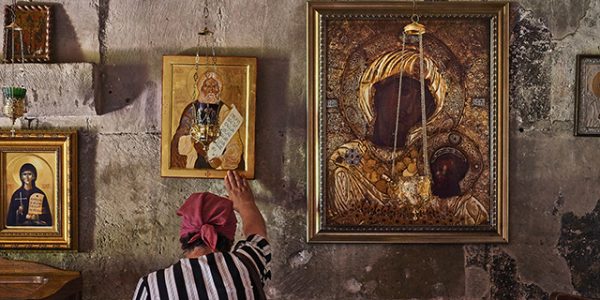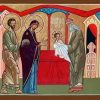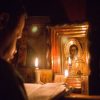“One of the best known of the Desert Fathers of fourth-century Egypt, Saint Serapion the Sindonite, traveled once on pilgrimage to Rome. Here he was told of a celebrated recluse, a woman who lived always in one small room, never going out. Skeptical about her way of life–for he was himself a great wonderer–Serapion called on her and asked: ‘Why are you sitting here?’ To this she replied: ‘I am not sitting, I am on a journey.’
I am not sitting, I am on a journey. Every Christian may apply these words to himself. To be a Christian is to be a traveler. Our situation, say the Greek Holy Fathers, is like that of the Israelite people in the desert of Sinai: We live in tents, not houses, for spiritually we are always on the move. We are on a journey through the inward space of the heart, a journey not measured by the hours of our watch or the days of the calendar, for it is a journey out of time into eternity.” (Metropolitan Kallistos Ware, The Orthodox Way, SVS Press).
What does it mean to be a true Christian–to walk as a committed disciple of Jesus Christ at the dawn of a new millennium of human existence? Once again, the Orthodox Church provides profound answers, based on two thousand years of Spirit-led experience.
In the teaching of the Orthodox Faith, salvation is never limited to a point in time. Salvation is not a one-dimensional event, a past-tense occurrence with merely philosophical or “positional” implications for the present. Rather, as illustrated above, salvation is perceived to be a lifetime experience–a journey “not measured by the hours of our watch or the days of the calendar, for it is a journey out of time into eternity.” Like every journey, this journey must have a beginning. And like every journey, this journey continues until it reaches its final destination. By faith we come to Christ. Through His sacraments we walk with Him daily–hour by hour, moment by moment. And with hope and love we move ahead to that time when we will be eternally in His presence, worshipping with the Angels. As Saint Paul says: “Now we see in a mirror, dimly, but then face to face. Now I know in part, but then I shall know just as I also am known” (1 Corinthians 13:12).
We now turn to a brief examination of the Christian life–how we become Christians, and how we remain in communion with God throughout our entire lives.
Beginning the Journey to the Kingdom
Most people, at one time or another, wonder if there is real meaning to life–an underlying pattern or purpose to it all. For me, that quest for meaning and purpose took place in college.
By the end of my junior year, I was ready to do a turn-around. I knew that Jesus Christ had a rightful claim on my life. And I had come to see that life apart from Him–even the enjoyable and constructive parts of life–held little meaning and satisfaction. I was into myself, out for myself, but at a point of wanting to start over…
An Incomparable Life
Often when we think about the life of Christ, we start two thousand years ago at a manger in the Middle East, with the Baby, the Wise Men, the Star. While these things concern His earthly birth. His story really begins in eternity past. Because before time began, before the world was made, before beginning, Christ was there. For there was never a time when he did not exist!
The first words in the Holy Bible are, “In the beginning God…” (Genesis 1:1). For God was there from the start, always existing in Three Persons: Father, Son, and Holy Spirit. From God the Father there was begotten or born from before all time God the Son. And eternally proceeding from the Father is God the Holy Spirit.
At the creation of the human race, we find God saying: “Let Us make man in Our image, according to Our likeness” (Genesis 1:26). Note the plurality of persons in the Godhead. Thus, from before all ages, God the Son–also called in Holy Scripture the Logos/Word of God–reigned with God the Father and God the Holy Spirit. This explains why the Gospels teach that God the Son, Jesus Christ, came to reveal the Father to us, and to send to us the comforter, the Holy Spirit.
Throughout the history of ancient Israel, the Prophets foretold the coming of the One Who would be the Messiah of Israel, the Anointed One. They predicted He would be born in Bethlehem…
“…Jesus Christ preached one central message. It is called the Gospel, the Good News, and it is this: “Repent, for the Kingdom of Heaven is at hand!” (Matthew 3:2). To repent means to turn around, to commit one’s life fully to Christ, to say “yes” to the Lord and absolutely mean it. And why are we called to this life of repentance? Because to enter God’s Kingdom there is one requirement, we must be righteous. We repent because we are unrighteous–we come far short of living lives that bring glory to God.
When we first repent, we turn to the Lord Jesus Christ and tell him we are sorry at heart for how we have lived. As undeserving sinners, we ask for His mercy and His forgiveness, and commit ourselves into His care for the rest of our lives.
Let’s face it. If the Kingdom of God is worth anything, it’s worth everything. We are called upon by Christ Himself to lay down everything that would keep us from entering it. That is why Jesus compared the Kingdom of God to a treasure hidden in a field. Once we realize the incredible value of that precious piece, we will sell everything we have to obtain it. This divesting of our private holdings is exactly what repentance means. We give up what we must not keep for the incomparable riches of Jesus Christ. This cost to us is the greatest bargain we can ever know.
Besides their love for Christ, there is at least one other vital characteristic the Saints, Confessors, Holy Fathers and Mothers, Martyrs, and host of others who lived their lives under the Lordship of Christ as fellow heirs of His Kingdom. They all grew to know God and serve Him in the Church. This stands in stark contrast to much of what is taught under the guise of Christianity. Tragically, some who still use His name have so willfully departed from the path which Christ set forth and those heroes and heroines of the Faith followed, that they have made knowing God nearly impossible. This, coupled with the churchless Christ of televangelism, has promoted people who sincerely desire to serve the Lord to try to make it on their own. But this option works no better.
Such and worse is the plight of those who try to follow Christ–even zealously–but Apart from the Church. They may be sincere, but they will never really get to know Him out there. For One must live within the Body of Christ, be fed by her Mysteria (Sacraments), be instructed in her true Faith, and worship at her altar to attain the godliness and righteousness that lead to the Kingdom’s open doors.
How to Remain in Communion With God
There are many necessary elements for remaining in communion with God. Among the chief are:
-
Regular attendance at Sunday Divine Liturgy, as well as consistent participation in the Feasts and fasts of the Church year.
-
Maintaining a daily prayer rule .
-
Daily reading and study of the Holy Scripture.
-
Regularly partaking of the Holy Eucharist (Holy Communion).
-
Regular repentance and confession of sins.

















